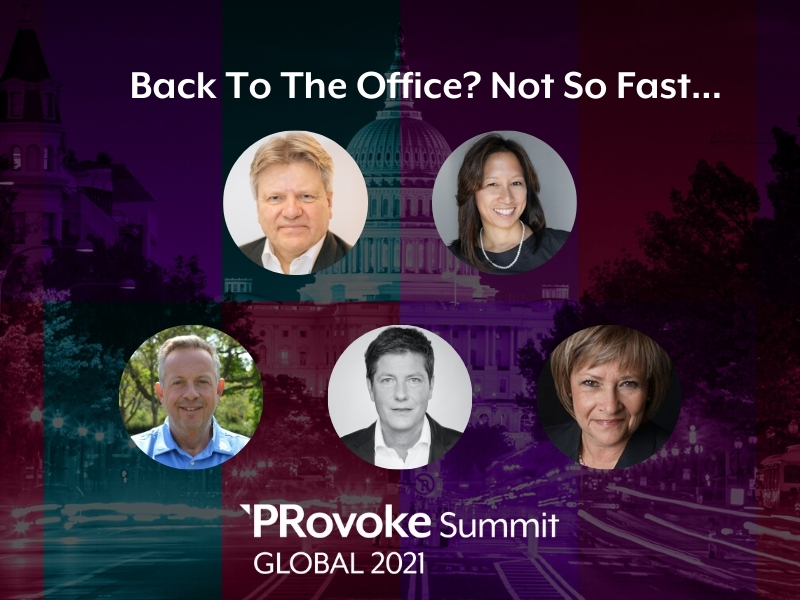Paul Holmes 26 Oct 2021 // 4:50AM GMT

Continuing to allow employees the flexibility to work from home can have advantages for both employers and workers, attendees at the 10th annual PRovoke Media Entrepreneurs’ Forum heard yesterday. But it also became clear that some agency heads continue to have concerns about culture, collaboration and creativity in the post-pandemic workplace.
Introducing a panel called “Back To The Office? Not So Fast,” longtime Entrepreneurs’ Forum partner Julian Boulding of thenetworkone cited statistics—from his own research and elsewhere—suggesting that many employees would like to continue with the freedom to work from home at least some of the time, and suggested that agency owners could find benefits ranging from reduced real estate costs to a more geographically diverse talent pool.
That argument was taken up by Carol Levine, co-founder and CEO of energi PR in Canada, who told the audience: “Before Covid, the physical office got a lot of attention: where it was located, should it have individual offices or open floors, did it have wooden beams and shared fridges? To an extent, the office defined what an agency was all about. There was a stigma to ‘working out of your basement.’ And managers wanted to walk down the hall and see people working.”
But working from home changed a lot of that. “The epiphany was that we were still doing great work. We had a lot of personal connection, we saw people on Zoom and we saw them in their own homes. There was a lot of empathy, yet we still got the work done. We didn’t need the big Xerox copier and the reams of paper. We function very well remotely. So in the medium term at least we have no intention of going back to the office.”
Remote working, she added, also gave the agency the ability to increase the available talent pool, particularly to include people who cannot afford to live in big cities.
That’s a benefit Valerie Chan, founder and principal of San Francisco-based Plat4orm PR, enjoyed long before the pandemic. Plat4orm has been a virtual agency from its foundation.
Chan says remote working was a perceptual problem before the pandemic: “Quality of care was a big issue for clients. Can they function as a team? Can they collaborate?” But Chan says the firm was able to address those issues, she adds, but in the pandemic environment it was easier to take on more client work and to serve them better, without needing to find new ways to work.
She says she is convinced that a virtual agency has an advantage when it comes to hiring, and that there is no significant difference in the degree of collaboration—as long as the right policies and processes are in place.
Trust and accountability are vitally important, she says. “It’s about who you hire. So we have taken a different approach to hiring. We have more senior talent. You have to make sure you have emotionally intelligent people, because you have to be able to intuit what people are really saying.
But Graham Goodkind, chairman and founder of UK-based Frank PR, is one agency leader who wants to see his people back in the office. “There’s no one size fits all solution,” he concedes. “But we are a creative agency, that’s our niche, and for a creative ideas-led agency, we do that best when people are together, and the more they’re together in brainstorms and when people are together, the better. Those ideas don’t only come in brainstorms, they come when people are walking out to get a sandwich for lunch.
“I actually felt we were being creatively compromised when we were forced to work from home. So when it was safe to do so and regulations allowed us to do so, we resumed normal office work.” The response from employees, he says, has been mostly enthusiastic: while some people have left to work for agencies that allow work from home, others have been attracted to Frank because “it’s fun, it has a great energy, and people want to be a part of that.”
He emphasized, however, that the Frank culture offers employees flexibility, that people can work from home when necessary, but that he continues to see the office environment—and the culture it creates—as a source of competitive advantage.
For Christian Josephi, founder and managing director of Germany agency Panama PR, the concerns about remote work and virtual offices—which he had considered before the pandemic—centered around trusting employees and surrendering a measure of control over their work hours and how the work got done.
“My brain was in an old entrepreneurs mindset, and absolute control. I lacked the trust to let go of that and there was this fear of letting go and giving 100% trust to all of our people.”
But he said the pandemic forced his firm to adopt work-from-home. “We were forced into it,” he claims. “We went completely virtual from an office-only environment.”
Then he came across a podcast featuring a former HR chief from SAP, which talked about the need to establish rules that fit your specific needs and culture—about when to be available to colleagues, how to prioritize clients and teams over personal preference.
“We set up some KPIs, but to me it is more fun to be better able to integrate my personal life and my professional life, and to incorporate breaks into my day. I can choose the liberty of hopping on and off during the working day.”
And he found that his people could be trusted, not because of Panama’s rules but because of the expectations of clients and fellow team members. The one aspect he says he misses is “the personal interaction. The challenge is how to create positive momentum at distance, and how to create interaction and empathy within the team.”
Panama has now made the switch to working from home permanent.



































.jpg)

















